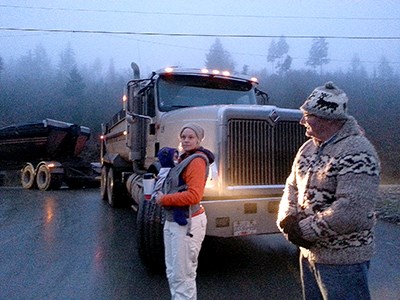A group of Vancouver Island residents wants a Port Moody company to stop dumping soil they say is contaminated into their watershed.
For nearly four years, Sonia Furstenau, the elected area director for Shawnigan Lake, has been leading efforts to stop a landfill from operating in the community's drinking watershed and says the soil from Pacific Coast Terminals is adding to their concerns about the site.
"It's a huge volume of it, for one thing; we understand it's between 60,000 and 80,000 tonnes" of contaminated soil, Furstenau said.
About 20 to 30 dump trucks were scheduled to empty soil daily through November and December.
But their biggest concern is with an engineering report submitted to the Cowichan Valley Regional District on Dec. 1 that shows water at the site is bypassing the water treatment system and going directly into a stream that leads to Shawnigan Lake. The lake is a direct water source for 6,000 people while the surrounding watershed provides drinking water for 12,000.
"The latest round of water testing showed the stream now has sodium chloride and sulphur," Furstenau said. "We've been promised all along that no water that comes into contact with the contaminated soil leaves the site without being treated and brought to drinking water standards, but this water is leaving the site untreated."
The engineering report was initiated after a storm water breach at the South Island Aggregates (SIA) site resulted in uncontrolled surface water flowing on to the neighbouring community forest site. It notes that it's unclear whether the permeable nature of the sediment pond is in keeping with its intended design or whether the storm water discharge adheres to the site's permits, but recommends the Ministry of Environment conduct a more thorough examination.
Samples from three sites immediately outside the SIA site contained trace metals that exceeded provincial contaminated site and water quality regulations.
"These two reports should be forwarded to the Ministry of Environment… expressing the CVRD's ongoing concerns of the environmental risk and impacts of the SIA site to the regional district's neighbouring property and downstream waterbodies," the report states.
Furstenau says after four days of recent heavy rainfall, the settling ponds are no more than small puddles, further demonstrating that water is seeping into fractured bedrock and leaving the site via an underground stream system.
"We've never accepted this risk in our watershed and we'll fight until it's stopped, and then we'll keep fighting until the soil that's been put in is removed," she added, noting under the Environmental Management Act the entity responsible for the soil is liable for its removal.
Wade Leslie, vice-president and general manager of PCT, said while he understands the concerns of Shawnigan Lake residents, the SIA site was chosen because it already holds the necessary permits and is monitored by the provincial government.
The soil is coming from an area of PCT's property where the potash storage shed will be built. The material isn't structurally sound enough for the heaviest parts of the shed but some of it will be re-used on other areas of the site, Leslie said.
He said he didn't have the technical data available but noted the soil contains elevated levels of sulphur, zinc and salt but it's far from toxic.
"I've heard a lot of misinformation out there," he said, noting the 1% or 2% that is sulphur is not the real challenge. "It's actually the salt that's given us the most problems. We're subject to ocean spray. This is reclaimed land just by how the site was built up from dredged material."
SIA's owners — Cobble Hill Holdings Ltd. and South Island Resource Management (SIRM) Ltd. — recently obtained an injunction against the protestors who have been blocking trucks trying to enter the site. An affidavit filed in support of the injunction notes the protestors were causing delays in a contract "in which adherence to the schedule for completion is critical for the client" since the soil must be cleared to make way for large-scale machinery that will be delivered.
If the schedule is not adhered to, the client would be forced to move to the next most competitive bidder at double the cost "and will look to SIRM for compensation for the difference," effectively bankrupting the company, according to the statement by a SIRM contractor.
On Tuesday morning, a B.C. Supreme Court judge in Victoria ruled the protestors may stand on the side of the road but not impede the trucks.
spayne@tricitynews.com
@spayneTC



